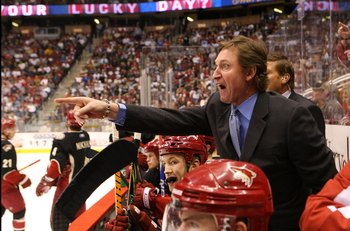
by Coach K, AllHabs.net
SAINT-LAZARE, QC — In previous weeks, I have gone over some of the facets of playing hockey. However, beyond the Xs and Os, line match-ups and game plans, there is a fine line between success and failure. This line is drawn by the coaching staff, and their emotional connection with their players.
Some would argue that being connected emotionally with a player is unimportant, and should not be addressed. This is, by far, the biggest problem with the coaching fraternity today. The attention to the game itself has become so paramount that coaches forget that the players following their instructions are nothing more than kids in adult bodies, following their dreams and aspirations. Regardless of their relationship with their coach, they still look at him as their leader. He is responsible for guiding them in the right direction, regardless of any situation.
From the time kids decide they want to play hockey, the coach is their friend, brother and father on the ice. He’s there to show them right from wrong, help them interact with others, and show them how to defend themselves when the situation demands it. The coach is their teacher and principal. He’s there to share his knowledge and philosophy with them and impose discipline when merited.
The same expectations players have as kids are those they expect as adults. Coaches in today’s game must remember that. They need to be able to distinguish which of their players they can push harder than others. Coaches must be able to connect with less confident players, and be able to bring out their best efforts. Finally, coaches need to remember they too once played the game. No one in today’s coaching ranks was perfect as a player, and they need to remind themselves of those situations.
Take someone like Wayne Gretzky as an example. While “The Great One” was arguably the greatest player to ever play, he was unable to convey his playing philosophy and coaching to his players. He often lost control behind the bench, choosing to vent his frustrations at officials, instead of trying to correct his team’s deficiencies. And while this approach may have worked for Gretzky when he was a player, there isn’t a coach today who will say that blasting a referee has gotten them anywhere.
A coach must also be a quick thinker behind the bench. He must be able to adapt his thinking in different situations, in order to counteract what the opposition is doing. Most coaches discuss their thinking with players prior to game time. They occasionally look at their internal leadership group for guidance and problem resolution. This allows for any in-game adjustments that may be required to be understood by all players, without surprise or confusion. Constantly attempting the same things over and over will allow the players to question your abilities to lead them as a coach, and alienate a few of them as well.
Even though some coaches seem dry and emotionless behind the bench, like the Canadiens’ Jacques Martin, they are constantly thinking. They must be able to compute everything that is going on around them, and come up with solutions on the fly. Simply changing your line-up around does constitute control. If a chess player makes the same moves, do his opponents not know what to expect? Coaches must disconnect their emotions from the game, and not become flustered when certain situations arise.
Take this past weekend’s back-to-back games versus the Red Wings and Toronto. In my opinion, Coach Martin allowed his frustrations to dictate his coaching approach. After two periods of effortless hockey, he pushed his players hard in the third, expending them both emotionally and physically. While this would be the right way to go if there were an off-day between games, dominating that ONE period against Detroit left the Canadiens with nothing in the tank for the Toronto Maple Leafs the next day. It allowed for one of the worst teams in the NHL to walk all over the Habs, and make them look much worse than they actually are.
There is no right or wrong way to coach every team in the NHL. Coaches are students of the game themselves, and are constantly learning and adjusting. Those who allow the game to control their actions, as opposed to their emotions, are much more successful.
(Photo by Bruce Bennett, Getty Images)